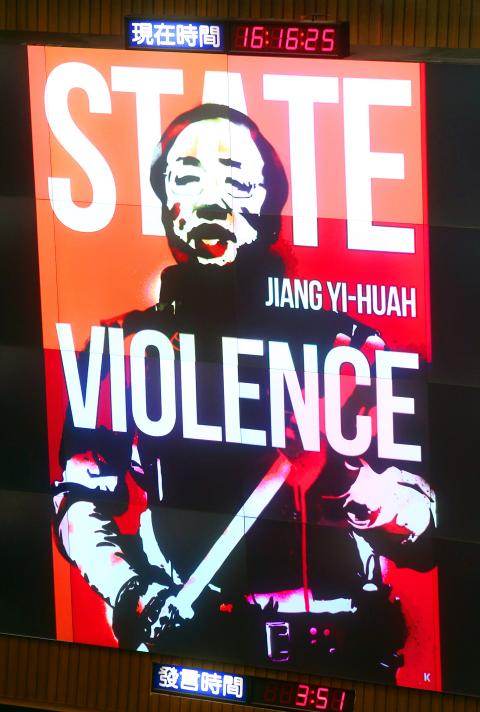|
Jiang stresses need for prompt eviction
’COUP D’ETAT’: The premier said that if ‘rioters and invaders’ had been allowed to seize the Executive Yuan the nation would have descended into chaos
By Alison Hsiao / Staff reporter

A satirical poster of Premier Jiang Yi-huah is shown in the legislature while Democratic Progressive Party Legislator Tuan Yi-kang questioned Jiang during an interpellation session at the Legislative Yuan in Taipei yesterday.
Photo: Liao Chen-huei, Taipei Times
The storming of the Executive Yuan by student-led protesters last month could have been interpreted by the international community as a coup d’etat if it had not been dealt with immediately, Premier Jiang Yi-huah (江宜樺) said yesterday.
Jiang made the remarks during the interpellation session yesterday on the floor, which was not blocked as some expected or planned — the Taiwan Solidarity Union said earlier in the week that it would boycott Jiang’s stepping on the podium for interpellation if he did not first apologize for the violent crackdown on protestors who had gathered at the Executive Yuan compound on March 24.
Chinese Nationalist Party (KMT) Legislator Chiu Wen-yen (邱文彥) asked Jiang to again explain what happened on March 18 and March 23.
Jiang said that after being notified of the “invasion by protesters at the Legislative Yuan,” he was aware of how serious police intervention at the Legislative Yuan would be, which if not sanctioned would infringe on legislative autonomy, so he made sure that Minister of the Interior Chen Wei-jen (陳威仁) first called Legislative Yuan Secretary-General Lin Hsi-shan (林錫山) to secure his approval for intervention at the Executive Yuan.
“To be 100 percent sure, Legislative Speaker Wang Jin-pyng (王金平) was also consulted about the matter, and he agreed with the decision to have police enter and remove invaders [from the Executive Yuan],” Jiang said.
“The occupation of the Legislative Yuan continued because Lin did not want us to manhandle opposition party lawmakers, who said they were blocking the entrances to ‘protect the students,’” Jiang said.
“And this is why the 323 occupation of the Executive Yuan was a completely different issue,” Jiang said, implying that while the legislature’s autonomy was to be respected, there was no such restriction for the “invasion” of the Executive Yuan.
He said that the protesters were not just trying to occupy the plaza outside the Executive Yuan’s main building, but “they also illegally entered offices, saying that they aimed to have the Executive Yuan unworkable the next day.”
“Those who got into the building were very close to breaking into the premier’s office, where confidential documents are kept. However, they were stopped by police,” he said.
“If they had succeeded, it would be these rioters and invaders in charge of the country’s top administrative center the next day. The country as a whole would have descended into chaos and the international community would have thought a coup d’etat or rebellion was attempted in the Republic of China,” he said.
Democratic Progressive Party Legislator Tuan Yi-kang (段宜康), questioned the necessity and urgency of force used by police in the early morning of March 24, when protesters on the plaza were bludgeoned to the ground, and driven back by water cannons.
Tuan cited Jiang’s article published in the Chinese-language China Times in 2006, published while the protest against then-president Chen Shui-bian (陳水扁) was ongoing, which said that “it would be to underestimate the mobility and energy needed to maintain a democratic society if people are asked not to take to the streets just because they are now endowed with the right to vote.”
Jiang added in the article that if the value of public movements is to be denied in a democratic system “simply out of concern for the irrational character or the social instability that are inevitably entailed by a mass movement, [we] would be falling for a Hobbesian authoritarian thinking trap.”
Tuan accused Jiang of going against what he had previously written and of overusing police force, a “clear malfeasance” that Jiang has asked “the perpetrators themselves [National Police Agency] to probe.”
Tuan also said that although Jiang has repeatedly said that the “crackdown” was to protect the administrative center from dysfunction the next day and the documents from leaking out, “[Jiang] cannot explain why [he] still chose to violently evict the protestors outside the building, starting at about midnight, after the building was free of protesters,” Tuan said.
source: Taipei Times
|